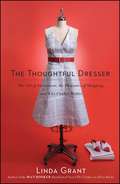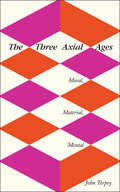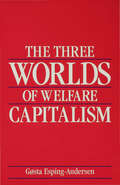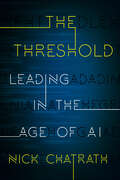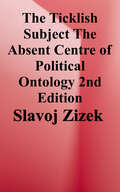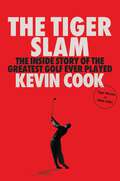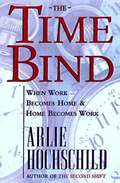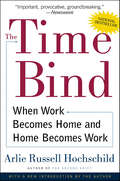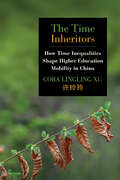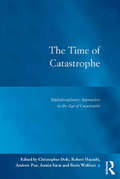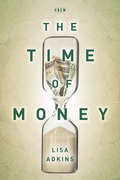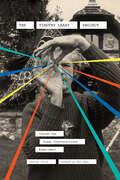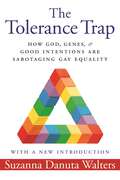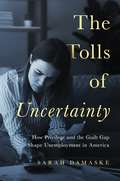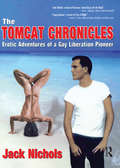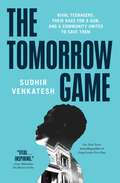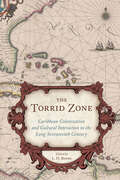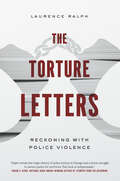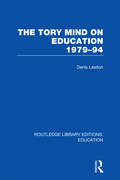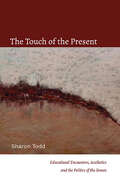- Table View
- List View
The Thoughtful Dresser
by Linda Grant"You can't have depths without surfaces," says Linda Grant in her lively and provocative new book, The thoughtful Dresser, a thinking woman's guide to what we wear. For centuries, an interest in clothes has been dismissed as the trivial pursuit of vain, empty-headed women. Yet, clothes matter, whether you are interested in fashion or not, because how we choose to dress defines who we are. How we look and what we wear tells a story. Some stories are simple, like the teenager trying to fit in, or the woman turning fifty renouncing invisibility. Some are profound, like that of the immigrant who arrives in a new country and works to blend in by changing the way she dresses, or of the woman whose hat saved her life in Nazi Germany.The Thoughtful Dresser celebrates the pleasure of adornment and is an elegant meditation on our relationship with what we wear and the significance of clothes as the most intimate but also public expressions of our identity.
The Thoughtful Dresser: The Art of Adornment, the Pleasures of Shopping, and Why Clothes Matter
by Linda Grant"You can't have depths without surfaces," says Linda Grant in her lively and provocative new book, The thoughtful Dresser, a thinking woman's guide to what we wear. For centuries, an interest in clothes has been dismissed as the trivial pursuit of vain, empty-headed women. Yet, clothes matter, whether you are interested in fashion or not, because how we choose to dress defines who we are. How we look and what we wear tells a story. Some stories are simple, like the teenager trying to fit in, or the woman turning fifty renouncing invisibility. Some are profound, like that of the immigrant who arrives in a new country and works to blend in by changing the way she dresses, or of the woman whose hat saved her life in Nazi Germany.The Thoughtful Dresser celebrates the pleasure of adornment and is an elegant meditation on our relationship with what we wear and the significance of clothes as the most intimate but also public expressions of our identity.
The Thousand and One Nights: Space, Travel and Transformation (Routledge Studies in Middle Eastern Literatures)
by Richard van LeeuwenThis volume discusses The Thousand and One Nights' themes of space and travel showing how they are used not only as a setting in which the story unfolds, but also as the dynamic force which propels the heroes and the story to the final dénouement. These events often symbolize a process of transformation, in which the hero has to search for his destined role or strive to attain the object of his desire. In this way, themes of travel are the narrative backbone of stories of various genres including love, religion, magic and adventure. This book not only gives a fresh approach to many stories of the collection, but also proposes new insights in the nature of The Thousand and one Nights as a self-reflexive narrative and is essential reading for scholars of Arabic literature.
The Three Axial Ages: Moral, Material, Mental
by John TorpeyHow should we think about the “shape” of human history since the birth of cities, and where are we headed? Sociologist and historian John Torpey proposes that the “Axial Age” of the first millennium BCE, when some of the world’s major religious and intellectual developments first emerged, was only one of three such decisive periods that can be used to directly affect present social problems, from economic inequality to ecological destruction. Torpey’s argument advances the idea that there are in fact three “Axial Ages,” instead of one original Axial Age and several subsequent, smaller developments. Each of the three ages contributed decisively to how humanity lives, and the difficulties it faces. The earliest, or original, Axial Age was a moral one; the second was material, and revolved around the creation and use of physical objects; and the third is chiefly mental, and focused on the technological. While there are profound risks and challenges, Torpey shows how a worldview that combines the strengths of all three ages has the potential to usher in a period of exceptional human freedom and possibility.
The Three U.S.-Mexico Border Wars: Drugs, Immigration, and Homeland Security (2nd Edition) (Praeger Security International)
by Tony PayanThis book addresses the three central issues that continue to dominate the U.S.-Mexico relationship today: drugs, immigration, and security. A required reading for many, including political and policy decision makers, civic activists and youth (the current and next generation of taxpayers concerned about fiscal responsibility), and multiple peoples in the borderlands. Readers will gain insight from this realistic narrative of the border.
The Three Worlds of Welfare Capitalism
by Gosta Esping-AndersenEsping-Andersen distinguishes three major types of welfare state, connecting these with variations in the historical development of different Western countries. He argues that current economic processes, such as those moving toward a postindustrial order, are shaped not by autonomous market forces but by the nature of states and state differences.
The Threshold: Leading in the Age of AI
by Nick ChatrathAccomplished leadership consultant Nick Chatrath offers a revolutionary framework for how leaders in all kinds of organizations can adapt to the new age of technology, like ChatGPT—the Age of AI— by leaning into the qualities and skills that make us uniquely human. For readers of Yuval Noah Harari’s 21 Lessons for the 21st Century and Max Tegmark’s Life 3.0, The Threshold is a bold new way to think about human, emotionally intelligent leadership right now as we stand at the threshold of AI superintelligence.We are living in a new age: the Age of AI. With developments emerging every day, Artificial Intelligence will soon surpass most human competencies, and as a result drastically transform technology’s role in our day-to-day world. The solution for organizational leaders is not to become more like computers. In order for our organizations to survive as we stand at the threshold of a new era, we must tap into the qualities that make us uniquely human.In the face of increasingly intelligent technology, old models of leadership are becoming obsolete. In The Threshold: Leading in the Age of AI, accomplished leadership consultant Nick Chatrath interweaves an analysis of antiquated leadership models—the ones that leave AI-Era organizations exposed and ineffective with colleagues frustrated, unmotivated, and burnt-out—with his newly developed strategies for more effective “threshold” leadership methods. Supported with anecdotes, research, and a practical toolkit, The Threshold demonstrates that adaptive, effective organizations can be built with human, emotional intelligence: cultivating stillness, nurturing independent thinking, finding rhythms of rest and performance, and raising leadership consciousness. With a basis in the ideas and practices that have shaped our organizations in the past, The Threshold illuminates how accessing advanced stages of human development can be both competitive and harmonious with AI’s growing insinuation into our working world.
The Ticklish Subject: The Absent Centre of Political Ontology (The Essential Zizek Series)
by Slavoj ZizekSlavoj Zizek, the maverick philosopher, author of over 30 books, acclaimed as the "Elvis of cultural theory", and today's most controversial public intellectual. His work traverses the fields of philosophy, psychoanalysis, theology, history and political theory, taking in film, popular culture, literature and jokes--all to provide acute analyses of the complexities of contemporary ideology as well as a serious and sophisticated philosophy. His recent films The Pervert's Guide to the Cinema and Zizek! reveal a theorist at the peak of his powers and a skilled communicator. <p><p>Now Verso is making his classic titles, each of which stand as a core of his ever-expanding life's work, available as new editions. Each is beautifully re-packaged, including new introductions from Zizek himself. Simply put, they are the essential texts for understanding Zizek's thought and thus cornerstones of contemporary philosophy. <p><p>The Ticklish Subject: The Absent Centre of Political Ontology: A specter is haunting Western thought, the specter of the Cartesian subject. In this book Slavoj Zizek unearths a subversive core to this elusive specter, and finds within it the indispensable philosophical point of reference for any genuinely emancipatory project.
The Tiger Slam: The Inside Story of the Greatest Golf Ever Played (Tiger Woods in 2000–2001)
by Kevin Cook&“A captivating tale.&” —Kirkus Reviews • &“Masterful.&” —Mark Frost • &“The rare must-read.&” —Alan Shipnuck • &“This book is truly as grand as it gets.&” —Jim NantzTwenty-five years ago, Tiger Woods achieved the greatest feat in golf history: the &“Tiger Slam.&” Now, for the first time, the award-winning author of Tommy&’s Honor delivers a riveting account of Tiger at his most brilliant—dominating the game in a way we will never see again.In 1997, as every schoolchild knows, Tiger Woods won the Masters by the largest margin in history, becoming the first Black player to win a major championship. Four years later, the world watches with breathless anticipation as he returns to Augusta National, aiming for a milestone no other golfer has ever achieved: four professional Grand Slam triumphs in a row. In The Tiger Slam, Kevin Cook delivers a gripping, inside-the-ropes account of an astonishing streak of victories that left Woods&’s rivals scrambling to keep up. Readers will hear from many of golf &’s biggest names—Tiger&’s caddie, his coach, his opponents, his idols, and others, all offering fresh insight into the electrifying highs of his victories and the obstacles on and off the course that threatened his relentless pursuit of perfection. We join Tiger at the beginning of his Slam: the 2000 US Open at Pebble Beach. In a notoriously grueling tournament designed to bring golfers to their knees, who could even dream of winning by a record margin of fifteen strokes? Tiger could. We follow him to the hallowed grounds of St. Andrews a few weeks later for the 2000 Open Championship, where he transforms his game to meet the singular demands of the links. Still only twenty-four, he leaves the Old Course as the youngest player ever to complete a career Grand Slam. We proceed with Tiger to the 2000 PGA Championship at Valhalla, where he fights a spectacular Sunday duel with a player he grew up idolizing, ending with a playoff that changes the course of golf history. Finally, we return to legendary Augusta National, site of his record-breaking first major championship, to see if he can be the first to sweep all four majors. Dogged by reports of an early-season slump, facing a supposedly &“Tiger-proofed&” course, golf&’s superstar tees off against his two fiercest adversaries in an unforgettable final round. The Tiger Slam is the epitome of greatness in sport, a feat as exhilarating today as it was twenty-five years ago. In fact, it&’s even more so, now that we know we&’ll never see its like again—such dominance is unthinkable in modern golf&’s era of parity. Kevin Cook invites us to close our eyes and remember a young champion at the peak of his powers: unmatched raw strength, single-minded focus, strategic genius, and utter fearlessness. The Tiger Slam takes readers behind the scenes in the thrilling months when Tiger Woods took an ancient game to new heights.
The Time Bind: When Work Becomes Home and Home Becomes Work
by Arlie Russell HochschildThe national bestseller that put "work/family balance" in the headlines and on the White House agenda. Hailed as the decade's most influential study of our work/family crisis.
The Time Bind: When Work Becomes Home and Home Becomes Work
by Arlie Russell HochschildThe national bestseller that put "work/family balance" in the headlines and on the White House agenda, with a new introduction by the author.When The Time Bind was first published in 1997, it was hailed as the decade's most influential study of our work/family crisis. In the short time since, the crisis has only become more acute.Arlie Russell Hochschild, bestselling author of The Second Shift, spent three summers at a Fortune 500 company interviewing top executives, secretaries, factory hands, and others. What she found was startling: Though every mother and nearly every father said "family comes first," few of these working parents questioned their long hours or took the company up on chances for flextime, paternity leave, or other "family friendly" policies. Why not? It seems the roles of home and work had reversed: work was offering stimulation, guidance, and a sense of belonging, while home had become the place in which there was too much to do in too little time. Today Hochschild's findings are more relevant than ever. As she shows in her new introduction, the borders between family and work have become even more permeable. With the Internet extending working hours at home and offices offering domestic enticements -- free snacks, soft music -- to keep employees later at their jobs, The Time Bind stands as an increasingly important warning about the way we live and work.
The Time Divide: Work, Family, and Gender Inequality (The Family and Public Policy)
by Kathleen Gerson Jerry A. JacobsIn a panoramic study that draws on diverse sources, Jerry A. Jacobs and Kathleen Gerson explain why and how time pressures have emerged and what we can do to alleviate them. In contrast to the conventional wisdom that all Americans are overworked, they show that time itself has become a form of social inequality that is dividing Americans in new ways—between the overworked and the underemployed, women and men, parents and non-parents. They piece together a compelling story of the increasing mismatch between our economic system and the needs of American families, sorting out important trends such as the rise of demanding jobs and the emergence of new pressures on dual earner families and single parents. Comparing American workers with their European peers, Jacobs and Gerson also find that policies that are simultaneously family-friendly and gender equitable are not fully realized in any of the countries they examine. As a consequence, they argue that the United States needs to forge a new set of solutions that offer American workers new ways to integrate work and family life.
The Time Inheritors: How Time Inequalities Shape Higher Education Mobility in China (SUNY series, Education in Global Perspectives)
by Cora Lingling XuReveals the role of time in reproducing inequalities as students navigate rural-to-urban, cross-border, and transnational higher education.Can a student inherit time? What difference does time make to their educational journeys and outcomes? The Time Inheritors draws on nearly a decade of field research with more than one hundred youth in China to argue that intergenerational transfers of privilege or deprivation are manifested in and through time. Comparing experiences of rural-to-urban, cross-border, and transnational education, Cora Lingling Xu shows how inequalities in time inheritance help drive deeply unequal mobility. With its unique focus on time, nuanced comparative analysis, and sensitive ethnographic engagement, The Time Inheritors opens new avenues for understanding the social mechanisms shaping the future of China and the world.
The Time Traveler's Guide to Regency Britain: A Handbook for Visitors to 1789–1830
by Ian MortimerA vivid and immersive history of Georgian England that gives its reader a firsthand experience of life as it was truly lived during the era of Jane Austen, Percy Bysshe Shelley, and the Duke of Wellington.This is the age of Jane Austen and the Romantic poets; the paintings of John Constable and the gardens of Humphry Repton; the sartorial elegance of Beau Brummell and the poetic licence of Lord Byron; Britain's military triumphs at Trafalgar and Waterloo; the threat of revolution and the Peterloo massacre. In the latest volume of his celebrated series of Time Traveler's Guides, Ian Mortimer turns to what is arguably the most-loved period in British history: the Regency, or Georgian England. A time of exuberance, thrills, frills and unchecked bad behavior, it was perhaps the last age of true freedom before the arrival of the stifling world of Victorian morality. At the same time, it was a period of transition that reflected unprecedented social, economic, and political change. And like all periods in history, it was an age of many contradictions—where Beethoven's thundering Fifth Symphony could premier in the same year that saw Jane Austen craft the delicate sensitivities of Persuasion. Once more, Ian Mortimer takes us on a thrilling journey to the past, revealing what people ate, drank, and wore; where they shopped and how they amused themselves; what they believed in, and what they were afraid of. Conveying the sights, sound,s and smells of the Regency period, this is history at its most exciting, physical, visceral—the past not as something to be studied but as lived experience.
The Time of Catastrophe: Multidisciplinary Approaches to the Age of Catastrophe (Law, Justice and Power)
by Austin Sarat Christopher Dole Robert Hayashi Andrew PoeIf catastrophes are, by definition, exceptional events of such magnitude that worlds and lives are dramatically overturned, the question of timing would pose a seemingly straightforward, if not redundant question. The Time of Catastrophe demonstrates the analytic productiveness of this question, arguing that there is much to be gained by interrogating the temporal conceits of conventional understandings of catastrophe and the catastrophic. Bringing together a distinguished, interdisciplinary group of scholars, the book develops a critical language for examining 'catastrophic time', recognizing the central importance of, and offering a set of frameworks for, examining the alluring and elusive qualities of catastrophe. Framed around the ideas of Agamben, Kant and Benjamin, and drawing on philosophy, history, law, political science, anthropology and the arts, this volume seeks to demonstrate how the question of 'catastrophic time' is in fact a question about something much more than the frequency of disasters in our so-called 'Age of Catastrophe'.
The Time of Money (Currencies: New Thinking for Financial Times)
by Lisa AdkinsSpeculation is often associated with financial practices, but The Time of Money makes the case that it not be restricted to the financial sphere. It argues that the expansion of finance has created a distinctive social world, one that demands a speculative stance toward life in general. Replacing a logic of extraction, speculation changes our relationship to time and organizes our social worlds to maximize the productive capacities of populations around flows of money for finance capital. Speculative practices have become a matter of survival, and defining features of our age are hardwired to their operations—stagnant wages, indebtedness, the centrality of women's earnings to the household, workfarism, and more. Examining five features of our contemporary economy, Lisa Adkins reveals the operations of this speculative rationality. Moving beyond claims that indebtedness is intrinsic to contemporary life and vague declarations that the social world has become financialized, Adkins delivers a precise examination of the relation between finance and society, one that is rich in empirical and analytical detail.
The Timothy Leary Project: Inside the Great Counterculture Experiment
by Jennifer UlrichThe life of Timothy Leary is examined through papers and correspondence preserved in his archive.The first collection of Timothy Leary’s (1920–1996) selected papers and correspondence opens a window on the ideas that inspired the counterculture of the 1960s and the fascination with LSD that continues to the present. The man who coined the phrase “turn on, tune in, drop out,” Leary cultivated interests that ranged across experimentation with hallucinogens, social change and legal reform, and mysticism and spirituality, with a passion to determine what lies beyond our consciousness. Through Leary’s papers, the reader meets such key figures as Allen Ginsberg, William S. Burroughs, Ken Kesey, Marshall McLuhan, Aldous Huxley, John Lennon and Yoko Ono, and Carl Sagan. Author Jennifer Ulrich organizes this rich material into an annotated narrative of Leary’s adventurous life, an epic quest that had a lasting impact on American culture.“A fascinatingly intimate record of how this brilliant, courageous, and awed genius changed our world.” —Michael Backes, author of the bestselling Cannabis Pharmacy“[These notes and letters] portray a brilliant and restless genius who never feared to make mistakes or change his views.” —Ralph Metzner, PhD, coauthor, with Leary and Alpert, of The Psychedelic Experience“Hopefully, these letters show people the real Timothy Leary—an inveterate letter writer who took the time to engage with all kinds of people. Few of us would be as generous.” —R. U. Sirius, cofounder of Mondo 2000 and coauthor of Transcendence
The Tolerance Trap: How God, Genes, and Good Intentions are Sabotaging Gay Equality (Intersections #3)
by Suzanna Danuta WaltersFrom Gleeto gay marriage, from lesbian senators to out gay Marines, we have undoubtedlyexperienced a seismic shift in attitudes about gays in American politics andculture. Our reigning national story isthat a new era of rainbow acceptance is at hand. But dig a bit deeper, and thisseemingly brave new gay world is disappointing. For all of the undeniable changes,the plea for tolerance has sabotaged the full integration of gays into Americanlife. Same-sex marriage is unrecognized and unpopular in the vast majority ofstates, hate crimes proliferate, and even in the much vaunted “gay friendly”world of Hollywood and celebrity culture, precious few stars are openly gay.In TheTolerance Trap, Suzanna Walterstakes on received wisdom about gay identities and gay rights, arguing that weare not “almost there,” but on thecontrary have settled for a watered-down goal of tolerance and acceptancerather than a robust claim to full civil rights. After all, we tolerate unpleasant realities: medicinewith strong side effects, a long commute, an annoying relative. Drawing on avast array of sources and sharing her own personal journey, Walters shows howthe low bar of tolerance demeans rather than ennobles both gays and straightsalike. Her fascinating examination covers the gains in political inclusion andthe persistence of anti-gay laws, the easy-out sexual freedom of queer youthand the suicides and murders of those in decidedly intolerant environments. Shechallenges both “born that way” storylines that root civil rights in biology,and “god made me that way” arguments that similarly situate sexuality as innateand impervious to decisions we make to shape it. A sharp and provocative cultural critique, thisbook deftly argues that a too-soon declaration of victory short-circuits fullequality and deprives us all of the transformative possibilities of fullintegration. Tolerance is not the endgoal, but a dead end. In The ToleranceTrap, Walters presents a complicated snapshot of a world-shifting moment inAmerican history—one that is both a wake-up call and a call to arms for anyoneseeking true equality.
The Tolls of Uncertainty: How Privilege and the Guilt Gap Shape Unemployment in America
by Sarah DamaskeAn indispensable investigation into the American unemployment system and the ways gender and class affect the lives of those looking for workThrough the intimate stories of those seeking work, The Tolls of Uncertainty offers a startling look at the nation’s unemployment system—who it helps, who it hurts, and what, if anything, we can do to make it fair. Drawing on interviews with one hundred men and women who have lost jobs across Pennsylvania, Sarah Damaske examines the ways unemployment shapes families, finances, health, and the job hunt. Damaske demonstrates that commonly held views of unemployment are either incomplete or just plain wrong. Shaped by a person’s gender and class, unemployment generates new inequalities that cast uncertainties on the search for work and on life chances beyond the world of work, threatening opportunity in America.Following in depth the lives of four individuals over the course of their unemployment experiences, Damaske offers insights into how the unemployed perceive their relationship to work. She reveals the high levels of blame that women who have lost jobs place on themselves, leading them to put their families’ needs above their own, sacrifice their health, and take on more tasks inside the home. This “guilt gap” illustrates how unemployment all too often exacerbates existing differences between men and women. Class privilege, too, gives some an advantage, while leaving others at the mercy of an underfunded unemployment system. Middle-class men are generally able to create the time and space to search for good work, but many others are bogged down by the challenges of poverty-level unemployment benefits and family pressures and fall further behind.Timely and engaging, The Tolls of Uncertainty posits that a new path must be taken if the nation’s unemployed are to find real relief.
The Tomcat Chronicles: Erotic Adventures of a Gay Liberation Pioneer
by Jack NicholsAn uncensored road trip through gay American life in the early sixties!Jack Nichols is now known as a founding father of the gay and lesbian liberation movement, editor of GAY (the first gay weekly newspaper), co-founder of the Mattachine Societies of Washington, DC, and Florida, and a warrior who broke ground for gay equality. In his early twenties, however, he was dedicated to romance, ardor, and wanderlust-living the life of a gypsy and making love with abandon. "MORE EXCITING THAN THE WILDEST FICTION. . . . Jack takes his reader on the road with him (Jack often hitchhiking in only T-shirt and jeans) where he encounters, beds down (and sometimes hustles) dozens of attractive 'numbers' who come his way."- Donn Teal, Author of The Gay Militants: 1971 & 1994"This might be called Jack Nichols' version of Kerouac's beat classic On the Road. With a variety of companions, and with little money in his pocket, in the early 60s, he drove, hitchhiked, rode buses, and even walked for a couple of long stretches from Washington, DC, to New York and then through West Virginia, Pennsylvania, Ohio, Michigan, and Illinois. He recalls in considerable detail a variety of individuals with whom he had erotic encounters. The title The Tomcat Chronicles is fully descriptive."- Vern L. Bullough, PhD, RN, Editor of Before Stonewall: Activists for Gay and Lesbian Rights in Historical Context"Jack Nichols, the gay liberation pioneer, has been a lifelong friend who helped to illuminate my concept of homophobia. Oscar Wilde believed one's life should be a work of art. Jack's life, which has always combined courage, social awareness and sexual passion, is certainly such a work."- George Weinberg, PhD, Author of Society and the Healthy Homosexual and 13 other books (the psychotherapist credited with coining the term homophobia)"THE VIVID DETAIL AND GRACEFUL PROSE THAT CHARACTERIZE THE WRITING OF JACK NICHOLS open a window into a time long before gay men appeared weekly on tv or before anti-sodomy laws had been banned."- Rodger Streitmatter, PhD, Author of Unspeakable: The Rise of the Gay and Lesbian Press in America"The Tomcat Chronicles is a gay pioneer's version of City of Night."- James T. Sears, PhD, Author of Rebels, Rubyfruit, and Rhinestones: Queering Space in the Stonewall South; Editor of the Journal of Gay & Lesbian Issues in Education (from the Foreword)
The Tomorrow Game: Rival Teenagers, Their Race for a Gun, and a Community United to Save Them
by Sudhir VenkateshA New York Times bestselling author&’s gripping account of a Chicago community coming together to save a group of teenagers from gun violence.In the tradition of works like Random Family and Behind the Beautiful Forevers, Sudhir Venkatesh&’s The Tomorrow Game is a deeply reported chronicle of families surviving in a Southside Chicago community. At the heart of the story are two teenagers: Marshall Mariot, an introverted video gamer and bike rider, and Frankie Paul, who leaves foster care to direct his cousin&’s drug business while he&’s in prison. Frankie devises a plan to attack Marshall and his friends—it is his best chance to showcase his toughness and win respect for his crew. Catching wind of the plan, Marshall and his friends decide they must preemptively go after Frankie&’s crew to defend their honor. The pressure mounts as both groups of teens race to find a gun and strike first. All the while, the community at large—a cast that includes the teens&’ families, black market gun dealers, local pastors, a bodega owner, and a veteran beat cop—try their best to defuse the conflict and keep the kids alive. Based on Venkatesh&’s three decades of immersion in Chicago&’s Southside, and as propulsive as a novel, The Tomorrow Game is a nuanced, timely look at the toll that poverty and gun violence take on families and their communities.
The Torrid Zone: Caribbean Colonization and Cultural Interaction in the Long Seventeenth Century (Carolina Lowcountry and the Atlantic World)
by L. H. RoperThe first comparative history of European settlers’ trading, pirating, and colonizing activities in the Caribbean.Brimming with new perspectives and cutting-edge research, the essays collected in The TorridZone explore colonization and cultural interaction in the Caribbean from the late 1600s to the early 1800s—a period known as the “long” seventeenth century—a time when these encounters varied widely and the diverse actors were not yet fully enmeshed in the culture and power dynamics of master-slave relations. The events of this era would profoundly affect the social and political development both of the colonies that Europeans established in the Caribbean and the wider world.This book is the first to offer comparative treatments of Danish, Dutch, English, and French trading, pirating, and colonizing activities in the Caribbean and analysis of the corresponding interactions among people of African, European, and Native origin. The contributions range from an investigation of the indigenous colonization of the Lesser Antilles by the Kalinago to a look at how the Anglo-Dutch wars in Europe affected relations between the English inhabitants and the Dutch government of Suriname. Among the other essays are incisive examinations of the often-neglected history of Danish settlement in the Virgin Islands, attempts to establish French colonial authority over the pirates of Saint-Domingue, and how the Caribbean blueprint for colonization manifested itself in South Carolina through enslavement of Amerindians and the establishment of plantation agriculture.The extensive geographic, demographic, and thematic concerns of this collection shed a clear light on the socioeconomic character of the “Torrid Zone” before and during the emergence and extension of the sugar-and-slaves complex that came to define this region. The book is an invaluable contribution to our understanding of the social, political, and economic sensibilities to which the operators around the Caribbean subscribed as well as to our understanding of what they did, offering in turn a better comprehension of the consequences of their behavior.“Covering a variety of undertakings, especially English but also Dutch, Danish, French and indigenous, this collection makes a welcome contribution to our understanding of a pivotal period in the history of the West Indies.” —Carla Gardina Pestana, University of California, Los Angeles“This illuminating collection of essays brings the Caribbean squarely into the frame of analysis strongly making the case that the experiences and developments of the Caribbean colonies remained crucial to the history of colonial America. The contributions cover the centrality of enslaved people’s labor and the actions of Indigenous and peoples of African descent who shaped the history of the region through their resistance, accommodation, and engagement.” —Ignacio Gallup-Diaz, Bryn Mawr College
The Torture Letters: Reckoning with Police Violence
by Laurence RalphTorture is an open secret in Chicago. Nobody in power wants to acknowledge this grim reality, but everyone knows it happens—and that the torturers are the police. Three to five new claims are submitted to the Torture Inquiry and Relief Commission of Illinois each week. Four hundred cases are currently pending investigation. Between 1972 and 1991, at least 125 black suspects were tortured by Chicago police officers working under former Police Commander Jon Burge. As the more recent revelations from the Homan Square “black site” show, that brutal period is far from a historical anomaly. For more than fifty years, police officers who took an oath to protect and serve have instead beaten, electrocuted, suffocated, and raped hundreds—perhaps thousands—of Chicago residents. In The Torture Letters, Laurence Ralph chronicles the history of torture in Chicago, the burgeoning activist movement against police violence, and the American public’s complicity in perpetuating torture at home and abroad. Engaging with a long tradition of epistolary meditations on racism in the United States, from James Baldwin’s The Fire Next Time to Ta-Nehisi Coates’s Between the World and Me, Ralph offers in this book a collection of open letters written to protesters, victims, students, and others. Through these moving, questing, enraged letters, Ralph bears witness to police violence that began in Burge’s Area Two and follows the city’s networks of torture to the global War on Terror. From Vietnam to Geneva to Guantanamo Bay—Ralph’s story extends as far as the legacy of American imperialism. Combining insights from fourteen years of research on torture with testimonies of victims of police violence, retired officers, lawyers, and protesters, this is a powerful indictment of police violence and a fierce challenge to all Americans to demand an end to the systems that support it. With compassion and careful skill, Ralph uncovers the tangled connections among law enforcement, the political machine, and the courts in Chicago, amplifying the voices of torture victims who are still with us—and lending a voice to those long deceased.
The Tory Mind on Education: 1979-1994 (Routledge Library Editions: Education)
by D LawtonThis book discusses conservative education policies since 1979 by referring to beliefs, values and attitudes. It relates ideology to policies and provides some background about the years before 1979 – definitions of Conservatism and descriptions of Tory beliefs and traditional Conservative views on education. The second part of the book provides a brief outline of the years between the 1944 Education Act and 1979.
The Touch of the Present: Educational Encounters, Aesthetics, and the Politics of the Senses (SUNY series, Transforming Subjects: Psychoanalysis, Culture, and Studies in Education)
by Sharon ToddHow are educational encounters understood, experienced, and lived? How are they conceptualized? How do they shape our being in and of the world? In this time of apparent distance and disconnect, this volume emphasizes the role of contact and connectedness in education, above all by understanding education as encounters, as embodied, sensory experiences. Drawing on a range of theoretical positions that highlight our profound interconnection with things and other bodies—from feminism to Buddhism to new materialism and beyond—Sharon Todd argues that educational encounters are formations of "touching" and "being touched by." They are singular in their eventfulness and yet bring us into relation with our environment. Focusing particular attention on two key issues for teachers and students today—the climate emergency and online education—The Touch of the Present offers unique insights into the aesthetics and politics of educational practices, seeing them as embodied processes that not only contribute to how one is socialized into a given order but also carry the transformative potential for "becoming" beyond the cultural scripts we are given.
